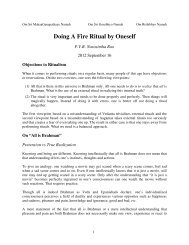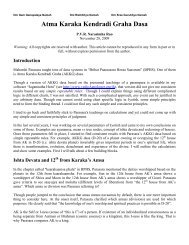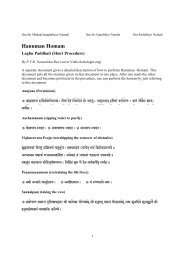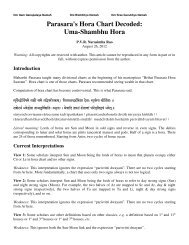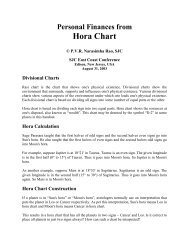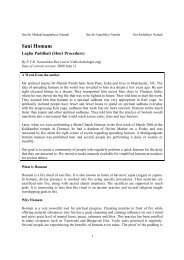The Glory of the Goddess-Devi Mahatmyam
The Glory of the Goddess-Devi Mahatmyam
The Glory of the Goddess-Devi Mahatmyam
Create successful ePaper yourself
Turn your PDF publications into a flip-book with our unique Google optimized e-Paper software.
<strong>The</strong> inner metaphorical significance <strong>of</strong> <strong>the</strong> <strong>Devi</strong> <strong>Mahatmyam</strong><br />
Now let us examine <strong>the</strong> significance <strong>of</strong> <strong>the</strong> <strong>Devi</strong> <strong>Mahatmyam</strong> or Saptashati from <strong>the</strong> level <strong>of</strong><br />
inner psychic reality. <strong>The</strong> <strong>Devi</strong> <strong>Mahatmyam</strong> begins with Markandeya narrating how a<br />
virtuous king named Suratha, dispossessed <strong>of</strong> his kingdom meets <strong>the</strong> merchant Samadhi who<br />
too has been dispossessed <strong>of</strong> his wealth and cast out by his own wife and children. Instead <strong>of</strong><br />
finding tranquillity amid <strong>the</strong> peaceful and spiritual surroundings <strong>of</strong> <strong>the</strong> sage Medhas’<br />
hermitage, <strong>the</strong>y are plagued by thoughts <strong>of</strong> loss, betrayal and attachment to <strong>the</strong> past. Toge<strong>the</strong>r<br />
<strong>the</strong>y approach <strong>the</strong> wise sage Medhas, whose task it is to awaken <strong>the</strong>m to a higher spiritual<br />
awareness. <strong>The</strong> king, <strong>the</strong> merchant and <strong>the</strong> sage are archetypal characters that reside in all <strong>of</strong><br />
us to differing degrees, characters with whom we can identify to varying degrees.<br />
<strong>The</strong> King, <strong>the</strong> Merchant and <strong>the</strong> Sage as allegories to <strong>the</strong> Body, Mind and Intellect<br />
Suratha is “one who has a good chariot” (su: good; ratha: chariot). <strong>The</strong> body is <strong>the</strong> chariot<br />
while <strong>the</strong> Self is <strong>the</strong> rider. “<strong>The</strong> Self is <strong>the</strong> rider, and <strong>the</strong> body <strong>the</strong> chariot; <strong>the</strong> intellect is <strong>the</strong><br />
charioteer, and <strong>the</strong> mind <strong>the</strong> reins” (Katha Upanishad 1. 3. 3). Man does <strong>the</strong> journey <strong>of</strong> life<br />
through <strong>the</strong> cycle <strong>of</strong> samsara with <strong>the</strong> chariot (ratha) <strong>of</strong> <strong>the</strong> body. In this long cycle <strong>of</strong><br />
innumerable births called samsara chakra, man goes through countless lives. <strong>The</strong> cycle <strong>of</strong><br />
samsara and its inevitable sufferings goes on as long as man does not realize that it is <strong>the</strong> Self<br />
(Atman) that is <strong>the</strong> rider and not <strong>the</strong> body or mind or pseudo-self. Unfortunately we continue<br />
to suffer till we realize this. According to <strong>the</strong> world-view <strong>of</strong> <strong>the</strong> <strong>Devi</strong> <strong>Mahatmyam</strong> , it is <strong>the</strong><br />
<strong>Goddess</strong> who is <strong>the</strong> Supreme Self. Hence as <strong>the</strong> Supreme Self She is <strong>the</strong> rider. Born a warrior<br />
(kshatriya) Suratha is endowed with a strong physique, a good body. By virtue <strong>of</strong> his<br />
strength, he is capable <strong>of</strong> protecting himself as well as o<strong>the</strong>rs. Initially he has all <strong>the</strong> material<br />
enjoyments that come naturally to a king. Yet he loses <strong>the</strong>m later on in life as one would<br />
expect in an impermanent and temporal world. This loss coupled with his continued<br />
attachment is <strong>the</strong> cause <strong>of</strong> his suffering. Till <strong>the</strong>n all along he had not realized that <strong>the</strong><br />
<strong>Goddess</strong>, <strong>the</strong> Supreme Self is <strong>the</strong> rider. So in spite <strong>of</strong> everything he was not truly a “Su”ratha<br />
or one with a good chariot.<br />
Samadhi, on <strong>the</strong> o<strong>the</strong>r hand is a merchant (vaishya). <strong>The</strong> word ‘samadhi’ indicates an<br />
integrated or concentrated or focussed mind, a mind that is absorbed in meditation (‘sam’:<br />
toge<strong>the</strong>r or integrated; ‘a’: towards; and ‘dha’: to hold). In o<strong>the</strong>r words <strong>the</strong> word ‘samadhi’<br />
denotes a focused or concentrated mind, a mind in meditation. As his name indicates,<br />
Samadhi, <strong>the</strong> merchant is single-minded or one-pointed in his pursuits. Being a merchant<br />
initially his focus is on wealth. Because he has <strong>the</strong> natural ability to be focused, he attains his<br />
goal-material wealth. In <strong>the</strong> first half <strong>of</strong> <strong>the</strong>ir lives <strong>the</strong> king and <strong>the</strong> merchant pursue <strong>the</strong>ir<br />
goals- power and riches-respectively and <strong>the</strong>y attain <strong>the</strong>ir goals. Both <strong>the</strong> king and <strong>the</strong><br />
merchant are good by nature. <strong>The</strong> king protects his subjects like his own children while <strong>the</strong><br />
noble merchant shares his prosperity with his whole family. But power and riches are not<br />
permanent in this ever-changing world. As is <strong>of</strong>ten <strong>the</strong> case both <strong>of</strong> <strong>the</strong>m lose <strong>the</strong>ir hardearned<br />
and well deserved power and riches. Cheated by people whom <strong>the</strong>y trusted, <strong>the</strong>y<br />
realise <strong>the</strong> limitations <strong>of</strong> worldly life. Apart from fate, <strong>the</strong>ir own relatives cheat <strong>the</strong>m. In fact<br />
<strong>the</strong> merchant’s wife and sons misappropriate his wealth and cast him out. In spite <strong>of</strong> <strong>the</strong>ir<br />
28



